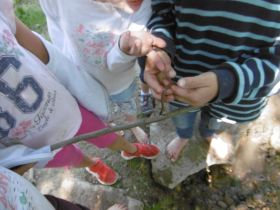Daily Schedule
A day in kindergarten
The day in kindergarten begins for the child with the arrival. The child finds a prepared group room. Each child is greeted personally by the pedagogical specialist, thus expressing: You are welcome, it is nice that you are here. At 9:00 a.m., the morning circle begins in the respective home group. The group gathers to sing, play, tell and listen to stories, share experiences, and discuss plans. The children learn and use the rules of communication and democracy, such as listening and being listened to, expressing and acknowledging opinions, being the center of attention and taking a position, and voting. This is also practiced in the large group, because at regular intervals the children of both groups meet for a children's conference, where events and plans are discussed according to clear communication rules or agreements are made concerning the entire group.
After the morning circle, all play areas are open to the children.
Each child has the opportunity to choose his or her own play area, play partner and activity material and to stay there as long as it suits his or her needs. This can be a small play group or concentrated work alone or in pairs in a quiet room.
During this time, the educator has the opportunity to observe the child, explore his or her needs and interests, and create developmental stimuli accordingly.
During the entire free play time, the children have the opportunity to eat the snack they have brought with them at a designated table.
During free play time, the children are offered introductions and continuations to the Montessori materials. Children who are interested in the particular material can watch and are included in the play. Areas outside the group room such as the garden, hallway, building corner, water experimentation area and doll corner can be used by the children for role play and play with lots of movement.
Cleaning up together ends the free play time.
The subsequent garden time offers the child opportunities to satisfy his or her urge to move, to practice various gross motor skills, and to experience the seasons firsthand with all the senses. For this purpose, muddy pants and rubber boots are stored in the kindergarten for each child to make this possible in (almost) any weather.
During garden time, pick-up time for parents also begins.
A week in the kindergarten
Within one week, the children are offered different activities and project-related actions.
Forest days
A regular offer is the weekly forest day.
The forest day currently takes place on Wednesdays. The entire kindergarten group meets on Tuesday, where each child has the opportunity to register for the forest day on the following day. In this way, the children can make their own decisions and take responsibility for them according to their own needs and interests.
Spending time in the forest encourages the children to move and explore in a variety of ways. Tree trunks invite them to balance, steep slopes want to be climbed and streams want to be jumped over. The forest offers a variety of sensory experiences: the children hear the birds chirping, smell the scent of resin and mushrooms, and see the light shimmering between the treetops. They can experience the rhythms and processes in nature, observe and marvel at the changing seasons, the growth of plants and the life of animals. This and much more makes the forest an attractive place to experience.
The registered forest children meet at 9:00 a.m. at the kindergarten, equipped with weather appropriate clothing and a backpack with snack and drink. Then it's off to the nearby forest. In this large experiential space, the forest group spends the morning, focusing on the encounter with nature and its changes during the different seasons, as well as playing with lots of movement.
A year in kindergarten
Christian education
The cycle of the year offers us many occasions to celebrate festivals with their customs. We make sure that the children experience the Christian faith and culture in a way that is appropriate for them. With rituals and Christian festivals oriented to the church year, we give life in our facility a pleasant rhythm.
We are interested in meeting other religions and are happy to celebrate their festivals with Muslim children, for example.
For Maria Montessori it was natural that children should be educated religiously. She herself was a strongly religious woman for whom religion meant a "source and support" of life. In her opinion, every human being has a natural need for religion.
*** Translated with www.DeepL.com/Translator (free version) ***




